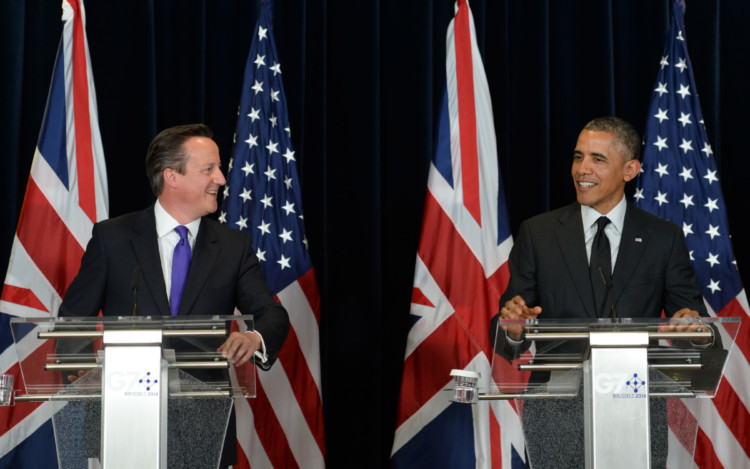So was he or wasn’t he? That’s the question on our lips this week following one of the most dramatic interventions in our referendum campaign thus far.
The leader of the free world said he wanted to see the UK remain “strong, robust and united” during a joint news conference with David Cameron at the G7 in Brussels.
Was the President speaking with conviction or doing Mr Cameron a favour?
On first impression, it was described as a coup for the No campaign, perhaps even bigger than Bowie who invited us to “stay” (leaving some doubt whether he meant we should stay in the UK or at his NYC gaff with him and Iman).
Ever the democrat, the President backed up his intervention by stating that: “Ultimately these are decisions that are to be made by the folks there.” After all, he had previously cited Scotland’s referendum as international best practice a line also followed by Mr Cameron and US Secretary of State John Kerry.
His eventual utterings left plenty of wriggle room, of course. It was not the most ringing endorsement ever issued and one that was focused on the US national interest (no change) rather than what was good for the people of Scotland. The UK is OK for the USA was about the sum of it.
But it seems from the latest reports that the President had his arm twisted to some extent. He was cajoled or persuaded by Mr Cameron into making some intervention, despite repeated previous US insistence that they would remain strictly neutral.
If it is true, it’s a bit hypocritical for Mr Cameron to call in international opinion given, in his attempt to avoid a face-to-face debate with the First Minister, he has repeatedly stated that the decision about Scotland’s future is for the people of Scotland.
But that’s not the point I want to make.
The real question is why did David Cameron ask for the favour and what does it reveal about the referendum?
The First Minister diagnosed it as a sign of weakness in the No camp that David Cameron has been lobbying people internationally to say anything to help.
We know the UK Government has been calling in favours left, right and centre after confirmation by a Scotland Office official that embassies all over the world had been subjected to their anti-Indy briefing project.
Commentators have said that they thought there would only be such a heavyweight international intervention if the Westminster establishment was sufficiently scared by narrowing polls. They would only call in the US Cavalry if they thought the referendum was slipping away.
President Obama’s intervention points to what could be the crucial weakness in the No side. Yes, it is a powerful establishment campaign and can use a largely London-based media and friends in high places to push its case. But it is up against a people-powered grassroots campaign which is perceived to be the underdog and by a population at large that is rightly suspicious of an establishment elite that has failed so abysmally in recent years. It reminds me of the recent book by the political author and journalist Malcolm Gladwell: David and Goliath. Gladwell says Goliath didn’t stand much of a chance against David as they had perceived the battle differently. The main lessons being that the strong are often surprisingly weak, if looked at from the right angle. People who seem weak can turn out to be surprisingly strong. Don’t be a Goliath. Dare to be a David.
Ultimately, I think these interventions don’t matter a jot to voters. Education, jobs and good governance are the kind of things people care about.
Such interventions don’t win votes, they win press coverage. But this particular intervention was revealing in another way too.
President Obama showed that Scotland is important for now. The referendum has put Scotland on the world stage but only voting Yes keeps us there.
As it stands Scotland is worthy of interest from the leader of the free world.
If there is a No vote Scotland will be a forgotten corner again. The president won’t be asked about us again if we hand back our power to Westminster, as the establishment wishes.
With a Yes vote, Scotland finds her place on the world stage. We can make our own small but significant contribution to peace and international justice, I hope, rather than war. We too can be a land of opportunity, using to the full our vast assets and talent to make our country better. We can engage fully with the wider world, making more of our great international reputation for the benefit of the people living here.
As a massive fan I thought it only fitting that I quote a man I admire so much and send him my own message. Mr President: Yes We Can. And Yes we should.
